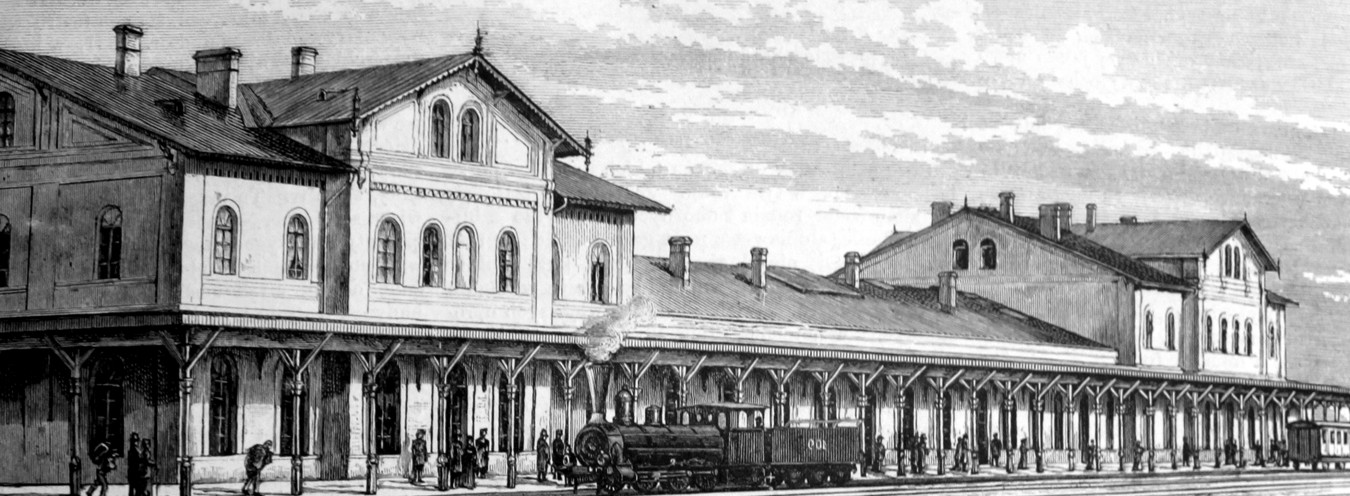
Prus’s Travels
Young travellers should not imagine that in order to get to know a country even in the most general manner, it is enough to have a ticket in your pocket and glasses on your nose. (Bolesław Prus, Kartki z podróży, I, 176).
Bolesław Prus rarely left Warsaw. He wrote in his journal that There are people-birds and people-trees. I, for example, like to bloom in one place. Despite his declared dislike of suitcases, he travelled both for leisure (mostly to Nałęczów) and for work, mostly as a press correspondent. He fulfilled his journalistic duties mostly travelling across Mazovia and Małopolska. In 1895, he set off for Germany, Switzerland, and France. His domestic and foreign reports were published in instalments in the press (Kurier Warszawski, Kurier Codzienny, Tygodnik Ilustrowany) – mostly titled as Kartki z podróży (Travel Notes).
Prus’s travels were always preceded with thorough theoretical research. The scholarly data was complemented with information from Baedekers and almanacs. In Kartki z podróży, he claims that library research is the foundation on which everybody should base one’s own careful observations, done wherever possible and as long as possible; the more research and the more observations, the more thorough the knowledge of a country. He was not really concerned with practical preparations. He ignored the advice from Hachette’s almanac concerning tourist accoutrement and left for Berlin (and later further west) just with one small suitcase, without sheets and one hundred other recommended items.
A reading of Kartki z podróży demonstrates that Prus was neither a recorder of impressions nor a historian-philosopher collecting remnants. There are no picturesque descriptions of places in the text or poetic explanations of history. Prus was a factographer, a conscientious observer of reality, who valued reliable information above all else. He represented a utilitarian approach and a positivist perspective. His reports frequently contained sociological sketches. He emphasised the educational and cognitive function of travel and he valued such an approach among other travellers. In the discussion about the sense of Stefan Szolc-Rogoziński’s expedition to Africa, Prus voiced his enthusiastic support for the venture, appreciating the scholarly value of the project and the enthusiasm of the young explorer thanks to whom – as he put it in his journal – the world knows that there are Poles interested in geography. He bemoaned, on the other hand, the shallow and pointless foreign travels of Poles who do not bring back any educational facts, no knowledge of European civilisation or customs of other cultures from abroad. Even more eagerly did he encourage tours of Poland, a country that we do not know and do not even consider exploring. Depending on the circumstances, Prus travelled by post chaise, wagon, riverboat, but above all by train. God bless the shadows of Watts, Stephensons and all that researched steam and railway – he wrote in his Kartki z podróży – thanks to their effort the distance to Siedlce, which in the past was covered by chaise in 12 hours and by wagon in 11, today takes one fourth of that time. Despite his admiration for the speed of the railway, in his journal, he compares it to a flying prison, which I cannot leave, or stop, and which I have to share with a company that is not always to my liking. A bicycle is a whole other case. The best – according to Prus – machine of the nineteenth century would not only enable people to travel fast (20 km per hour) but gave them freedom as well: I go wherever I please, I graze and rest where I want to, and I have no travelling company.
→ Baedeker; → Travels of the Characters in The Doll; → Holiday;
Bibliografia
- B. Prus, Kartki z podróży, vol.1 and 2, Warsaw 1950.
- B. Prus, Kroniki, vol. 20, Warsaw 1970.
- B. Prus, Kroniki, ed. S. Fita, vol. 1, Warsaw 1987.
- E. Malinowska, Podróże Prusa i Sienkiewicza, Kielce 1997.


